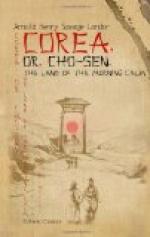reached, when another hundred is passed through, and
so on, until several thousands are sometimes strung
to one string. As curious as this precious load
itself was the way in which it was carried. It
is, in fact, the national way which all Corean coolies
have adopted for conveying heavy weights, and it seems
to answer well, for I have often seen men of no very
abnormal physique carry a burden that would make nine
out of ten ordinary men collapse under its heavy mass.
The principle is much the same as that used by the
porters in Switzerland, and also in some parts of
Holland, if I am not mistaken. A triangular wooden
frame rests on the man’s back by means of two
straps or ropes passed over the shoulders and round
the arms. From this frame project two sticks,
about 35 inches in length, on which the weight rests,
and by bending the body at a lower or higher angle,
according to the height or pressure of the load, a
perfect balance is obtained, and the effort of the
carrier considerably diminished. For heavy loads
like wood, for instance, the process of loading is
curious. The frame is set upon the ground, and
made to remain in position by being inclined at an
angle of about 45 deg. against a stick forked at the
upper end, with which every coolie is provided.
When in this position, the cargo is put on and tied
with a rope if necessary; then, the stick being carefully
removed, squatting down gently so as not to disturb
the position of the load, the coolie quickly passes
his arms through the straps and thus slings the thing
on to the back, the stick being now used as a help
to the man to rise by instalments from his difficult
position without collapsing or coming to grief.
Once standing, he is all right, and it is wonderful
what an amount of endurance and muscular strength
the beggars have, for they will carry these enormous
loads for miles and miles without showing the slightest
sign of fatigue. They toddle along quickly, taking
remarkably short steps, and resting every now and
then on their forked stick, upon the upper end of
which they lay their hands, forcing it against the
chest and the ground, and so making it a sort of
point
d’appui.
Just a word as to the coolie’s moral qualities.
He much resembles in this the Neapolitan lazzarone—in
fact, I do not know of any other individual in Eastern
Asia that is such a worthy rival of the Italian macaroni-eater.
The coolie will work hard when hungry, and he will
do his work well, but the moment he is paid off the
chances are that, like his confrere on the
Gulf of Naples, he will at once go and drink a good
part of what he has received; then, in a state of intoxication,
he will gamble the next half; and after that he will
go to sleep for twenty-four hours on a stretch, and
remain the next twelve squatting on the ground, basking
in the sun by the side of his carrying-machine, pondering,
still half asleep, on his foolishness, and seeking
for fresh orders from passers-by who may require the
services of a human beast of burden. Then you
may see them in a row near the road-side drinking huts,
either smoking their pipes, which are nearly three
feet in length, or if not in the act of smoking, with
the pipe stuck down their neck into the coat and down
into the trousers, in immediate contact with the skin.




